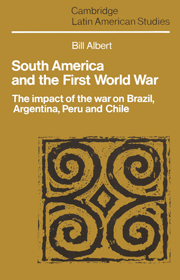Book contents
- Frontmatter
- Contents
- Tables
- Acknowledgments
- Introduction
- 1 Before the War
- 2 The early impact of the War
- 3 The recovery of trade during the War
- 4 Seeking financial solutions
- 5 The War and the growth of manufacturing industry
- 6 The War and the workers
- 7 After the War
- Notes
- Bibliography
- Index
- CAMBRIDGE LATIN AMERICAN STUDIES
2 - The early impact of the War
Published online by Cambridge University Press: 22 October 2009
- Frontmatter
- Contents
- Tables
- Acknowledgments
- Introduction
- 1 Before the War
- 2 The early impact of the War
- 3 The recovery of trade during the War
- 4 Seeking financial solutions
- 5 The War and the growth of manufacturing industry
- 6 The War and the workers
- 7 After the War
- Notes
- Bibliography
- Index
- CAMBRIDGE LATIN AMERICAN STUDIES
Summary
As soon as blood began to flow oh the battlefields of Europe the war claimed an unseen, but important, victim–the international economy. Its carefully balanced multilateral structure, which had withstood the battering of other wars and innumerable crises, soon lay in complete ruins. The outbreak of war came at a time when the world economy was still suffering from recession, largely brought about by the wars in the Balkans (1912–13), and all Latin American countries seem to have been badly affected by this. But its consequences were to prove rather mild when compared to the calamitous and widely felt impact of the war. In August of 1914 there was virtually a total collapse of the financial and commercial infrastructure which underpinned world trade and upon which Latin America relied so heavily. None of the basic services could be readily found. Shipping and insurance became scarce and expensive, banks shut their doors, capital and credit completely dried up, and sterling bills disappeared. Not surprisingly, the import and export trades were all but suspended. In consequence, government finance, local commerce, the supply of food and fuel, industrial production and employment were all severely disrupted. The war-induced crisis was, of course, felt throughout the highly interdependent world economy, but of the neutral countries it was in the primary product exporters, with many of the levers of economic power directly controlled by foreigners and economies particularly vulnerable to externally generated disequilibrium, that the shock waves extended most rapidly and penetrated most deeply into the interstices of society.
- Type
- Chapter
- Information
- South America and the First World WarThe Impact of the War on Brazil, Argentina, Peru and Chile, pp. 37 - 54Publisher: Cambridge University PressPrint publication year: 1988

